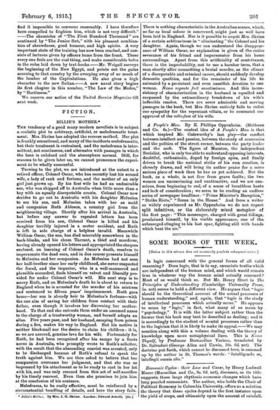FICTION.
BILLIE'S MOTHER,•
Teen tendency of a good many modern novelists is to subject a realistic plot to arbitrary, artificial, or melodramatic treat- anent. Mrs. Shrine has adopted the reverse method. Her plot is frankly sensational, and many of the incidents melodramatic, but their treatment is restrained, and the melodrama is inter- mittent, not continuous, and alternates with passages in which the tone is subdued and the atmosphere normal. Still, for reasons to be given later• on, we cannot pronounce the experi- ment to be wholly successful.
Turning to the plot, we are introduced at the outset to a retired officer, Colonel Oscar, who has recently lost his second wife, a lady of rank and fortune, and the mother of an only girl just grown up. By his first wife be had an undesirable eon, who was shipped off to Australia when little more than a boy with an equally disreputable cousin. Colonel Oscar now decides to go out to Australia with his daughter Melusina to see his son, and Melusina takes with Ler as maid and companion Ruth Ableson, a country girl from the neighbouring village. Shortly after his arrival in Australia, hat before any answer to repeated letters has been received from his son, Colonel Oscar is killed and his daughter• terribly injured in a motor accident, and Ruth is left in sole charge of a helpless invalid. Meanwhile William Oscar, the son, has died miserably somewhere in the back-blocks, and his chum Tarrant, a thief and murderer, having already opened his letters and appropriated the cheques enclosed, on learning of Colonel Oscar's death, resolves to impersonate the dead man, and in due course presents himself to Melusina and her companion. As Melasina had not seen her half-brother since her• early childhood, she never suspected the fraud, and the impostor•, who is a well-mannered and plausible scoundrel, finds himself on velvet and liberally pro- vided for under Colonel Oscar's will. His next step is to many Ruth, and on Melusina's death he is about to return to England when be is arrested for the murder of his mistress and sentenced to fifteen years' imprisonment. Ruth goes home—ben son is already heir to Melusina's fortune—with the one aim of saving her children from contact with their father, even though it involves her diaawning her mother- hood. To that end she entrusts them under an assumed name to the charge of a trustworthy woman, and herself adopts an alias. Five years pass, and her husband, escaping from prison during a fire, makes his way to England. But his motive is neither blackmail nor the desire to claim his children: it is, so we are assured, genuine love for his wife. Fortunately for Ruth, be had been recognized after his escape by a Scots nurse in Australia, who promptly wrote to Ruth's solicitor, with the result that the absconding convict was arrested, only to be discharged because of Ruth's refusal to speak the truth against him. We are then asked to believe that her compassion overcame her judgment, and that she was so impressed by his attachment as to be ready to cast in her lot with his, and was only rescued from this act of self-sacrifice by his timely rearrest. Even then she promises to join him at the conclusion of his sentence.
Melodrama, to be really effective, must be reinforced by a circumstantial handling of details, and here the story fails.
• Belies Mother. Ds Yrs:J.-It aline. —Loudest: Beware Armies Val- There is nothing characteristic in the Australian scenes, which, so far as local colour is concerned, might just as well have been laid in England. Nor is it possible to acquit Mrs. Shrine of a certain arbitrariness in "eliminating" the Colonel and his daughter. Again, though we can understand the disappear. ance of William Oscar, no explanation is given of the entire severance of his friend and impersonator from his home surroundings. Apart from this artificiality of contrivance, there is the improbability, not to use a harsher term, that a man shortly after committing a brutal murder, as the climax of a disreputable and criminal career, should suddenly develop domestic qualities, and for the remainder of his life be animated by a persistent and even unselfish devotion to one woman. Nemo repente fait sanetissimus. And this incon- sistency of characterization in the husband is equalled and surpassed by the extraordinary breakdown of his wife's inflexible resolve. There are some admirable and moving passages in the book, but Mrs. Skrine entirely fails to enlist our sympathy for the repentant villain, or to command our approval of the rolls face of his wife.






































 Previous page
Previous page